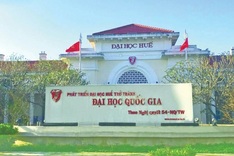Primary schools in Ho Chi Minh City are facing a serious shortage of English teachers.
 |
| First-grade students of Phan Dinh Phung Primary School studying English |
The 2011-2012 academic year marks the second year since a pilot programme to expand foreign language teaching and learning for the national education system for the 2008-2020 period following the PM\'s direction has been run. It is also the thirteen year that the Ho Chi Minh City Department of Education and Training has implemented English teaching in primary schools.
Shortage
Le Cong Minh, Headmaster of Tran Quang Khai Primary School in District 1, said, “We don’t have any recognised English teachers at the school. Many years ago, we found English teachers through intermediary centres, however, all of them only worked at the school for a few months and then moved to other places. I have to find teachers through friends and use the money previously given to the centres to increase salaries.”
However, despite Minh’s great efforts, the school has only attracted two English teachers.
Bach Thi Anh Ngoc, Headmaster of Nguyen Dinh Chieu Primary School in Binh Thanh District, said, “In the 2011-2012 school year, the school has only managed to recruit three English teachers under temporary contracts. The school has given them gifts on holiday occasions and encouraged them to join the school’s activities in an attempt to keep them.”
Nguyen Dinh Chieu Primary School now applies an optional two lessons a week English learning programme for students. In the near future, if the school launches a more expansive programme, it may encounter more difficulties to find and keep English teachers. The same situation is replicated at many other local primary schools, including Phu Huu in District 9, Binh Loi Trung and Tri Duc in Binh Thanh, Lam Son in District 6 and Tran Quoc Thao in District 3.
Nguyen Dat Su, Vice Headmaster of Luong Dinh Cua Primary School in District 3, said, “With the current modest pay of VND20-30,000 (USD0.96-1.44) per hour, it’s not easy for schools to find qualified teachers.”
Under the Ministry of Education and Training (MoET)’s regulations, English teachers in pilot programmes are not allowed to teach over 18 hours per month. Therefore, the total salary an English teacher can afford to earn is a meagre VND1.4-2.1 million (USD67.3-USD100) per month, excluding other benefits.
“Most of the schools can only recruit new graduates or those who work in other areas and consider teaching as a way to earn extra money,” said a headmaster of a primary school in Ho Chi Minh City said.
Improvements
The country will complete the universalisation of English teaching for third-grade pupils by 2019. However, to date, a mere 72 primary schools have piloted the project.
The MoET estimates that to implement the project from now to 2020, the country will need an additional 24,000 English teachers for primary schools. Yet at present, the country does not have a single college or university capable of training the teachers. Most of the current English teachers have graduated from English university faculties and then undertaken a short-term training course on teaching methods.
Some schools even recruit students who have studied overseas and those working for UK, US, Australian and Singaporean non-governmental organisations, affecting the quality of their teaching.
In the 2011-2012 school year, MoET decided to lower the standard for primary-school English teachers to a TOEFL score of 400, from a lower margin of 550 points.




















